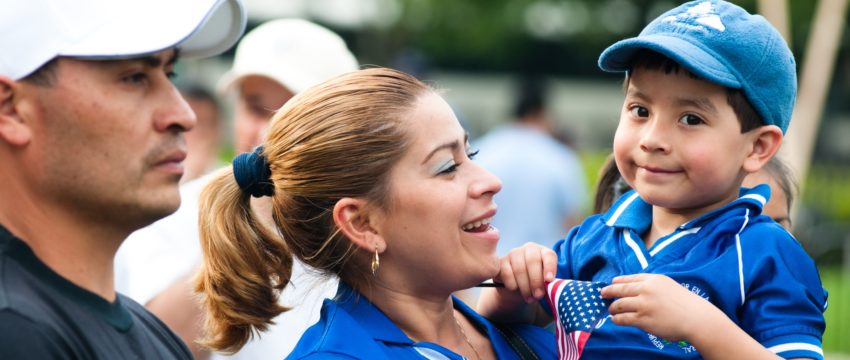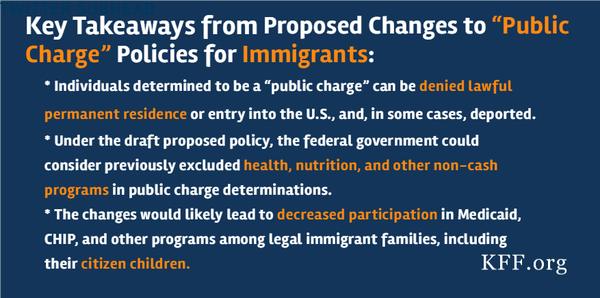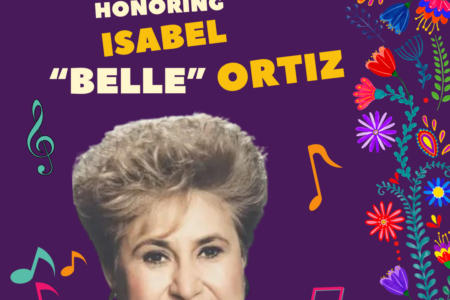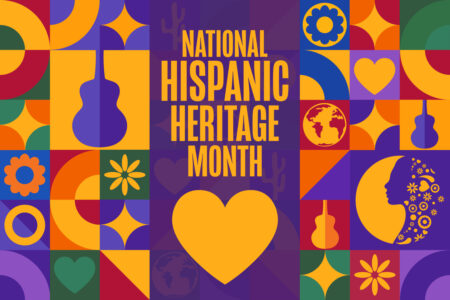
Share On Social!
The Trump administration recently announced draft regulation that would penalize legal immigrants applying for green cards if they use public benefits, such as food assistance, according to the Department of Homeland Security.
This is called “Public Charge.”
What Does Public Charge Mean for Immigrants?
Part of federal immigration law for over 100 years, the Public Charge test is designed to protect American taxpayers by identifying people who may depend on the government as their main source of support.
For a Public Charge test, immigration officials look at all a person’s circumstances in determining whether they are likely to become a public charge in the future, both positive and negative. This includes age, health, income, assets, resources, education/skills, family they must support, and family who will support them. If the government determines a person is likely to become a “public charge,” it can deny a person admission to the U.S. or lawful permanent residence (or “green card” status), according to the National Immigration Law Center.
The proposed change would expand the forms of public assistance counted when making a “public charge” determination.
For example, under the proposed rules, legal immigrants who apply for Medicaid, SNAP, and public housing benefits may lose their legal status.
“This would force immigrant families to make an impossible choice between meeting basic needs and keeping their families together in this country,” according to the National Immigration Law Center.
 Kaiser Family Foundation also wrote about the effect of the proposed changes.
Kaiser Family Foundation also wrote about the effect of the proposed changes.
What Does Public Charge Mean for Kids?
It is a known fact that one of the most effective tools for keeping kids and their families healthy are nutrition assistance programs such as WIC and SNAP, especially for Latino and minority populations.
Many kids and their families’ health will suffer as parents may be fearful of signing up, even if the program is not included in this new policy.
Childhood education will also take a hit.
Without these nutritional programs, kids will come to school hungry. This means they will have trouble paying attention, misbehave more easily, and/or suffer from headaches and/or stomach aches. All this results in less learning.
Take Colorado, for example.
More than 48,000 Colorado children, many of them U.S. citizens, could be disenrolled from one of two public health insurance programs, such as Medicaid or Child Health Plan Plus, according to an article.
More than 50 Colorado schools could be affected. Colorado schools receive funding through a program, called the School Health Services program, that allows districts to receive reimbursements for services provided to low-income students with disabilities.
Families may also stop using beneficial programs such as Head Start and the Denver Preschool Program.
“The fear has always been there in these communities,” Monica Parra, program manager of the Denver school district’s migrant education program, told Chalkbeat. “Now, people are even more afraid.”
David A. Super wrote in the L.A. Times about the proposal Public Charge change, which has affected Rosa, an undocumented immigrant in New York who used to get about $190 per month from SNAP (Rosa is pictured above via Bebeto Matthews of the Associated Press).
Rosa stopped taking benefits fearing deportation.
This same kind of fear has kept immigrants from seeking help during the recent hurricanes and floods.
Doctors Weigh In
“I’m afraid to apply for food stamps to help feed my new baby because I don’t want the government to come after us.”
“I don’t dare apply for health insurance because I don’t want immigration to know where I live.”
“I can’t call the police on my abuser because they’ll deport me.”
These are the concerns three primary care physicians often hear.
Dr. Sarah Kimball, Dr. Nicolette Oleng, and Dr. Elisabeth Poorman, are three primary care physicians in Boston who work with immigrant patients and their families on a daily basis.
We have long told our patients what we believed to be true: that accessing nutrition, health care and other government services they were eligible for would help keep them healthy and safe. It now looks like we were wrong, they wrote in a commentary for WBUR.
What Can You Do?
Speak up!
The Public Charge proposal is not yet policy. Federal officials are seeking public comment on the Public Charge proposal.
Explore More:
Embracing ImmigrantsBy The Numbers
44
million
immigrants live in the United States



